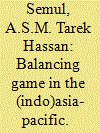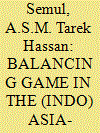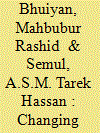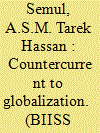|
|
|
Sort Order |
|
|
|
Items / Page
|
|
|
|
|
|
|
| Srl | Item |
| 1 |
ID:
165536


|
|
|
|
|
| Summary/Abstract |
The (re)emergence of China and the relative decline of the power of the United States (US) as the unipolar super power has shifted the geostrategic centre of gravity towards the Asia-Pacific region, also known in its extended form as Indo- Pacific region. Multiple new and frozen flashpoints have emerged in this region as China is increasingly seeking to tilt the power balance in its favour and the US is growing doubtful and impatient regarding the Chinese intentions. To mitigate the China threat, the US has already rebalanced its foreign policy under the Obama administration from the Middle East to the Pacific and current President Trump has extended the geographical reach of his new grand strategy of Free and Open Indo-Pacific to bring the Indian Ocean into play. One of the most predominant discourses that tries to explain this emerging great power relation and power transition is the ‘Thucydides Trap’. This discourse maintains a binary understanding that in a bipolar setting, the rise and decline of great powers make war inevitable. However, this oversimplified assumption may lead to a limited understanding of a region which has emerged with the support of the liberal order and slowly replacing the West as the epicentre of economic progress. This paper argues that there are ‘other discourses’ where middle and smaller regional powers not necessarily stranded between great power rivalry, rather they renegotiate the order in the (Indo)Asia-Pacific region to create multipolarity. On the contrary, the interdependence of the US and China in a globalized world compels the great powers to find ways to keep peace in the troubled waters of the Indo-Pacific. To find out to what extent all these discourses are intertwined and influence each other is another objective of this paper.
|
|
|
|
|
|
|
|
|
|
|
|
|
|
|
|
| 2 |
ID:
165535


|
|
|
| 3 |
ID:
167800


|
|
|
|
|
| Summary/Abstract |
The nature and means of conducting warfare have always been changing. Technology, political realities and ideologies continue to play crucial role in this transformation as witnessed in the two world wars, the Cold War, and in following decades. Non-state actors became more visible and important. Nowadays, many wars involve such actors against state parties, for example, the US global war on terror, Israel-Hezbollah War (2006) and the current war against the Islamic State (ISIL). The term hybrid war involves a combination of traditional and nonconventional means, has become a common subject of discussion. But hybrid war is nothing new and has been practiced since ancient times. Several countries have now resorted to hybrid war: one such country is Russia, who has been blamed by western countries in this regard, e.g., in Georgian War (2008), Crimea (2014), ongoing conflict in eastern and south Ukraine, disinformation campaign against the West and interference in their governance process. Russia similarly, blames them for its destabilization by increased military presence on its borders and inciting revolutions in neighbour countries. Meanwhile, countries are developing hybrid warfare capacities, including plans for deploying military robots. Non-state actors now also use hybrid means like the Hezbollah or ISIL and several ongoing wars are becoming growingly hybrid; besides, the clash of ideologies, i.e., religious radicalism vs. white supremacism can create conflicts, indicating future wars may be even more so. Yet, some old mechanisms and strategies are likely to remain relevant and useful in future wars as well, suggesting their true ever-evolving and hybrid character.
|
|
|
|
|
|
|
|
|
|
|
|
|
|
|
|
| 4 |
ID:
162486


|
|
|
|
|
| Summary/Abstract |
The world has been witnessing a disrupting socio-political phenomenon of the emergence of right-wing populism. What is particularly striking about this is that it has concurrently affected politics and society both in Europe and the United States (US). There are several alarming consequences of the rise of right-wing populism, such as increasing rift between races and ethnicities, between and among social classes, and finally between cultures. It runs the risk of reversing the gains accrued from globalization and the ideas such as liberal democracy. Given the weight of this new socio-political phenomena, the article seeks to identify the causes behind the rise of populism. It argues that the roots of populism can be traced in the uneven development among states exacerbated by globalization process. The process has allowed for flight of capital from one country to another, and thereby, creating and perpetuating a new class of ultrarich. This has created inequality among states. The emergence of right-wing populism can be seen a knee-jerk reaction to the globalization.
|
|
|
|
|
|
|
|
|
|
|
|
|
|
|
|
|
|
|
|
|